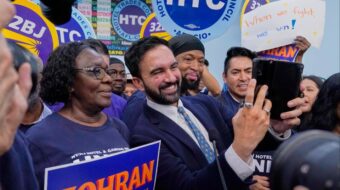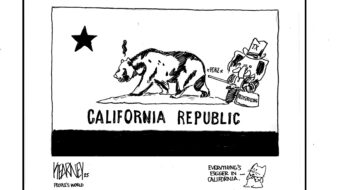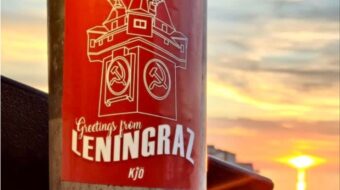The broad democratic coalition that elected Barack Obama faces sharp attack from the ultra-right as well as from some on the left and it is critical for progressives to come to its defense.
This coalition is multi-class and is basically an alliance of two constituent groupings. The first comprises the people’s forces led by organized labor and includes racially oppressed communities, youth, women, and many progressive organizations and movements fighting for peace, environmental protection and social justice. The members of this grouping have their own programs which are generally in advance of the platform and program of the Obama administration and while this grouping was critical, in no way was it able to elect Obama on its own. It needed the organization, resources and standing of the corporate liberals and moderates who lead the Democratic Party.
There are obvious conflicts and contradictions between the two groups but there was agreement on one thing – the need to defeat the Republicans and end the 30-year nightmare of increasingly right-wing government and assault on the living standards and rights of working people, as well as its reckless foreign policy. The success of this alliance produced an additional democratic breakthrough of profound historic importance – the election of our country’s first African American president, whose roots and sympathies are with the people’s forces.
The election was a serious setback for the dominant right-wing section of the U.S. ruling class but, as has become clear over the past year, did not in any way represent their fundamental defeat. Even with the loss of the White House and from a minority position in Congress, the right has been able to block significant progress on every front, especially the economic crisis and health care.
After being in power for decades, the right-wing is deeply entrenched, not only in elected branches of government, but also in the courts, the military, the intelligence community, the media, the churches, the think tanks, etc. They do not recognize Obama’s presidency and are determined to make his government fail. They see this as their only hope of returning to power and continuing to push the country in a fascist direction.
With total control over the Republican Party their tactics have become clear. They seek in lockstep to block the normal functioning of the national government even on routine appointments or on measures that they themselves endorsed. They obviously cannot propound their real program of maximizing corporate profits and power, slashing living standards, pursuing aggressive war and restricting democratic rights. They seek to block progress on the economic crisis and through their various media and ideological outlets use racism and anti-communism to incite fear and prejudice and build a phony populist grassroots movement.
The success of their efforts was demonstrated by the special election in Massachusetts, which serves as a warning of the danger of serious setbacks in the 2010 mid-term elections. The initiative of the AFL-CIO to build a mass movement for jobs is of utmost importance in and of itself but also in creating a political climate to counter this danger. It is urgent for progressives to build this movement as well as work directly in the electoral arena to hold the line. The fact is, despite their frantic efforts, the right has been weakened, and it is possible to make gains both legislatively and electorally.
This is all the more reason why it is necessary to answer the divisive actions of those on the left who seek to focus and divert the anger of progressives into a sharp attack on the Democrats and the Obama administration.
This does not mean we cannot criticize Obama and the Democrats. The expansion of the war in Afghanistan cannot be justified, nor can Obama’s support for charter schools or the futile attempts to appease and cooperate with the Republicans. These are all reflections of the influence of the corporate forces inside the administration.
Labor and its allies have no intention to stop pushing for action that goes beyond the limited programs offered so far to deal with health care and unemployment. But the leaders of the people’s forces understand that criticism of a coalition partner is not the same as criticism of the main enemy and cannot be conducted in an irresponsible way that feeds the phony populism of the ultra-right and threatens the survival of the coalition. Support for Obama is not unconditional, but until the ultra-right danger is ended or until labor and its allies have another way to take power, the coalition is essential.
Resistance to the ultra-right section of the U.S. ruling class is not simply a short-term policy aimed at immediate relief for working people. It is that, but it is part of a much deeper project to significantly weaken monopoly capital and shift power into the hands of the people. In fact, the ultra-right is so deeply entrenched that dislodging it may have revolutionary implications. A liberal democratic government may be incapable of the task and the fight could result in labor and its allies becoming dominant.
But until that happens there is no alternative to the democratic coalition.
There are many echoes of the current situation in the history of the New Deal. During the first Roosevelt administration the attitude of the left was sectarian and equated the Democrats and Republicans. In the second administration beginning in 1936, the Socialist Party continued the sectarian line, joined with the Trotskyite Socialist Workers Party and disappeared as a force in U.S. politics. The Communist Party, on the other hand, adopted the broad democratic coalition policy, immersed itself in the mass movement to organize industrial workers and the building of broad alliances against fascism among youth, cultural workers and in the nationalities movement. The influence and size of the CP grew to its greatest degree in U.S. history and the right has spent 70 years trying to uproot the popular gains that were made. Battered but unbowed, organized labor, Social Security, unemployment compensation, a progressive income tax, civil rights and democracy itself have survived.
Progressives need to relearn the rich lessons of that experience and defend the democratic coalition.










